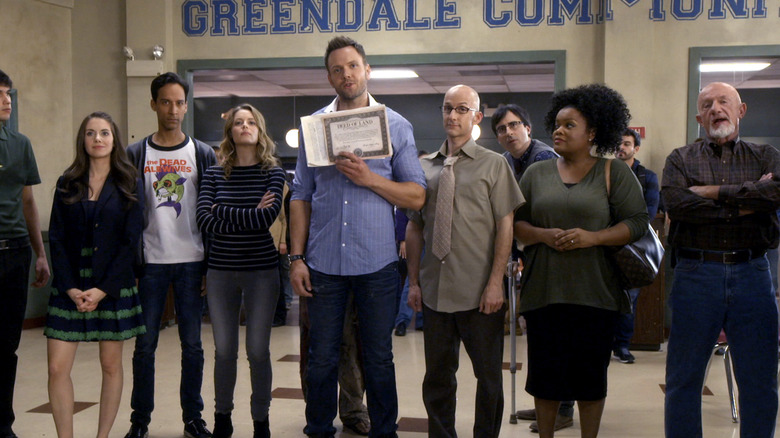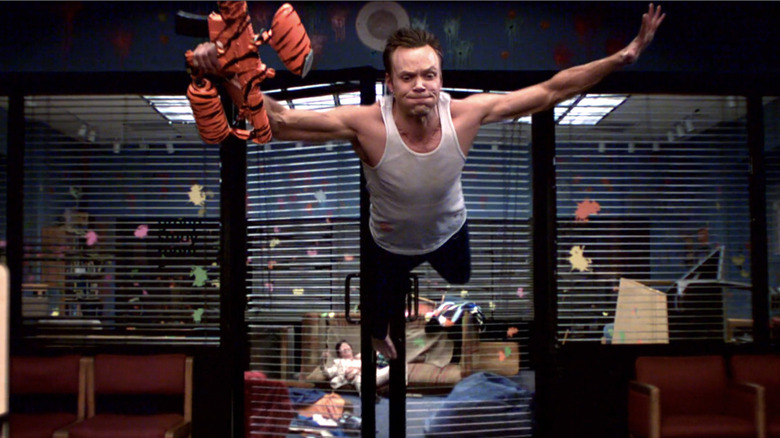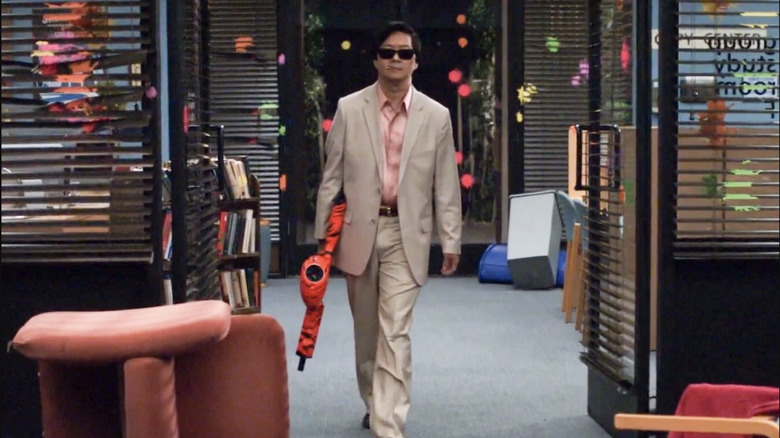Community's Writers Had To Learn Where They Could Bend The Rules Of TV
You don't get a show as irreverent and meta as "Community" without pushing the boundaries of your writing. Episodes like "Remedial Chaos Theory" and "Biology 101" pushed the limits of what you would expect from a traditional sitcom. Whether it was using the concept of alternate realities to show each member's contributions to the study group or an homage to "2001: A Space Odyssey" that put on display the insecurities and fears of one of the main characters, the "Community" crew knew how to create a provocative and entertaining television show.
According to series creator Dan Harmon, coming up with such outlandish concepts required him and other writers to push themselves creatively. Part of that process involved asking themselves questions one wouldn't normally expect to ask when writing a sitcom set in a community college. Learning where they could bend the rules of TV would soon become crucial to the success of "Community."
The 'top no-no' questions
In an interview with Salon, Dan Harmon was asked what rules need to be observed when writing an episode of "Community." Harmon believed that once the writers realized they were at a point of thinking about rules, they would need to take a step back and ask the question: why? He explained:
"In point of fact, we often stumble across things. We will suddenly realize that we've been thinking in terms of rules, and we take that opportunity to stop at that moment and ask ourselves why those things are rules."
To give an example of what sort of ideas for episodes could come from unexpected thought processes, Harmon had this to say:
"I need to give a particular example: the first season's paintball episode was the result of a conversation that began with a thought experiment asking the very question you just asked me.
I said, 'Take the top no-no. Is it possible to do a Columbine episode? Is it possible to have shootings in a school? Is there a way to get away with that without offending anybody?' And then somebody said, 'Well, paintball would be an example.' The thought experiment ended there, but that's where the question led us. That conversation led there."
Rewarding thought experiments
Harmon isn't necessarily looking to offend anybody, given the actual nature of the paintball episodes compared to the possibly controversial question that led to their creation. Bending TV rules doesn't always equate to shock value or addressing taboo subjects. Instead, the show's writers saw it as an opportunity to find fresh and exciting ideas you wouldn't normally expect to see from sitcoms like "Community."
"Community" is all the better because of these thought experiments. The paintball episodes featured in seasons 1 and 2 are some of the best in the series. Used as homages to movies as varied as Sergio Leone's "Man With No Name" trilogy and "Star Wars," it's hard to believe that such essential episodes started with a question as out-there as the one Harmon posed in the earlier quote. It's also important to note that Harmon and the other writers behind the show knew how far they could push the envelope, never going too far with their thought experiments.
Overall, Dan Harmon and other writers involved with "Community" understood that while some rules of TV are immovable, it's their job as creatives to find out which rules have become less important over time. It's just one of many reasons why "Community" was, and remains, great.


